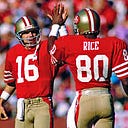Member-only story
Shown the Door
Openings, opportunities, and the triangle offense
The fourth letter in the Hebrew alphabet is dalet. Its name is connected to the Hebrew word delet, meaning door. In a more mystical sense, dalet is a passageway, an opening, a chance to cross over to a better place, an opportunity to transform and ascend to a higher state of being. In the ancient Hebrew alphabet the symbol for dalet is a triangle.
When I hear the word “triangle”, I don’t think about geometry or the instrument you play if you’re not that good at playing instruments. I think about Phil Jackson. On April 19th, ESPN began airing “The Last Dance”, a 10-part documentary series on the Chicago Bulls dynasty of the 1990’s and, man, is it good. And I say that as a Knicks fan, who gets the willies every time I hear that loathsome riff that kicks off the Bulls’ pregame intro song.
In 1989, when Jackson became head coach of the Bulls, the team’s singular mission to was to find a way to beat the Detroit Pistons in the NBA playoffs. At that time, the Pistons were known as the NBA’s Bad Boys because they were a bunch of thugs who played dirty. But they also played well. The Bulls just couldn’t get past them, even with Michael Jordan leading the charge. Jackson recognized therein lay the problem.
“The spotlight is always on the ball,” Jackson said in the documentary. “If it’s always in [Jordan’s] hands, they can build a defense around that. We need to find a way to make everybody better.”
